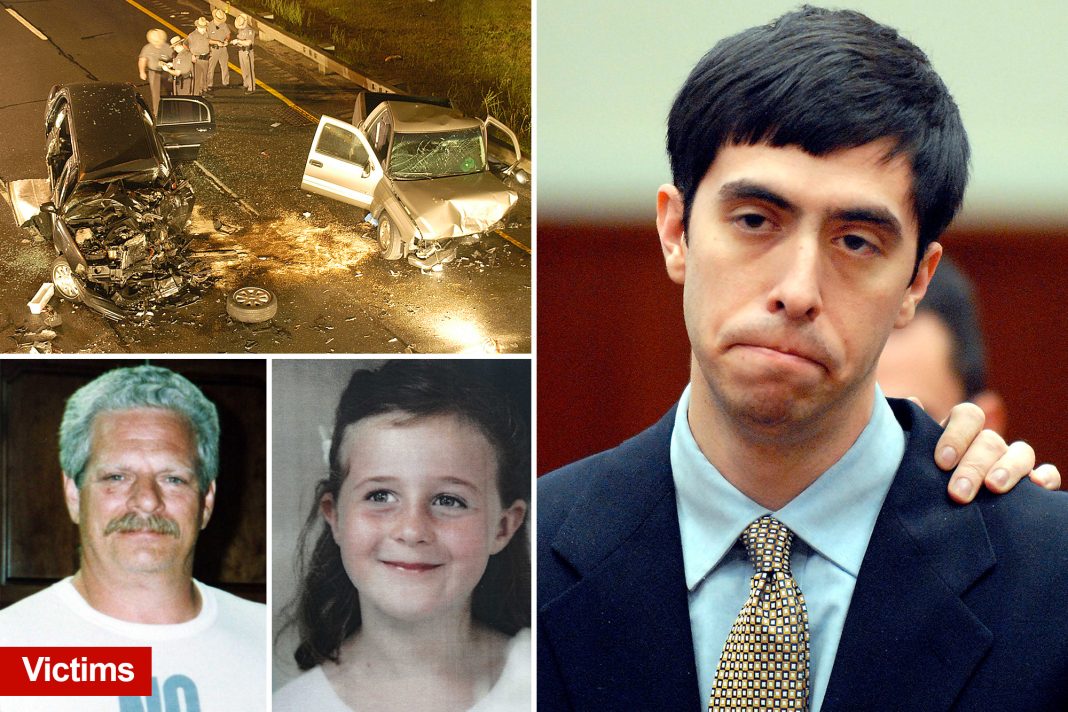The recent release of Martin Heidgen, a convicted murderer responsible for the tragic death of 7-year-old flower girl Katie Flynn and her family’s chauffeur, has ignited a firestorm of outrage among the victims’ families and the public alike. After serving 19 years for his crimes, Heidgen walked out of prison under parole conditions, a decision that has left a profound impact on those who continue to mourn the senseless loss of their loved ones.
On July 2, 2005, Heidgen, then 24, drove his pickup truck the wrong way for nearly three miles down the Meadowbrook Parkway in Freeport, Long Island. His blood alcohol content was reported to be more than three times the legal limit when he collided head-on with a limousine carrying Katie Flynn, her little sister Grace, and their family members, returning from a wedding celebration. The crash not only claimed Katie’s life but also took the life of Stanley Rabinowitz, the family’s hired chauffeur.
The aftermath of this tragic event continues to haunt the families involved. Joyce Rabinowitz-Schuster, widow of the deceased driver, expressed her anguish and frustration in a recent statement, saying, “This liberalism is a bullet into the back of the families who suffer the loss of their loved ones.” Her sentiments reflect a wider concern regarding perceived leniency in the criminal justice system, particularly in cases involving violent crimes. She further lamented, “There is no accountability in New York State anymore. Murder should be 25 years minimum. Crime is rising in NYS because of these dismissive attitudes, and it must stop.”
Katie Flynn’s parents, Neil and Jennifer Flynn, articulated their sorrow in a statement, emphasizing how the parole board’s decision has resonated deeply within their family. “We asked that the public may know our sadness and feel our pain,” Jennifer Flynn stated. “Katie was murdered as a 7-year-old girl; where her murderer lives, imprisoned or paroled, makes no difference in our lives.” Their plea serves as a reminder of the real and lasting consequences of violent crime—not just on the immediate victims but on their families and communities.
Heidgen was convicted of two counts of murder, three counts of first-degree assault, and tampering with physical evidence, leading to a sentence of 19 years to life. Despite attempts to appeal his conviction, he was unsuccessful. The decision to grant him parole was made by a state board, which acknowledged his potential for rehabilitation. However, the circumstances surrounding his release have raised questions about the effectiveness of the parole system in addressing the needs of victims and their families.
In the wake of Heidgen’s release, his attorney, Stephen LaMagna, expressed that Heidgen is “forever remorseful” for the pain he has caused. While remorse is an important aspect of rehabilitation, many argue that it does not equate to the accountability that families like the Flynns and Rabinowitz-Schuster believe is necessary. The juxtaposition of Heidgen’s remorse against the backdrop of the families’ unending grief highlights a significant disconnect in how society handles cases of severe wrongdoing.
The emotional turmoil experienced by the victims’ families is compounded by the ongoing debate surrounding criminal justice reform and the appropriate balance between rehabilitation and punishment. As crime rates fluctuate and public safety concerns mount, the voices of those directly affected by such tragedies call for a reassessment of policies that may seem to prioritize the rights of offenders over the needs of victims.
In conclusion, the release of Martin Heidgen serves as a stark reminder of the complexities inherent in the criminal justice system, particularly as it pertains to alcohol-related vehicular homicides. It raises critical questions about accountability, the potential for rehabilitation, and the need for a system that truly considers the lasting impact of crime on victims and their families. As public discourse continues to evolve, it is essential that the narratives of those affected by violent crimes are heard and understood, ensuring that their pain is not forgotten in the pursuit of justice.

